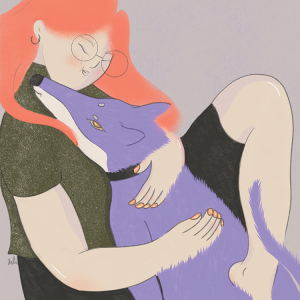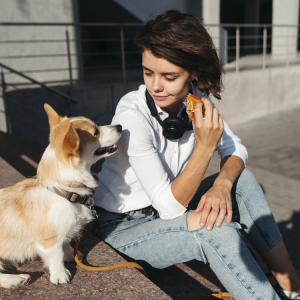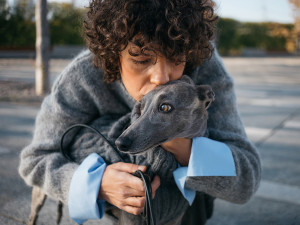Your Dog Might Actually Care When You Cry, Says Science
Cue the Phoebe Bridgers—your pup may just soak up your tears.

Share Article
People who say that pets don’t understand human emotions clearly have never had their laps nuzzled or tears licked away during an ugly-cry session. They have a special way of picking us when we’re down, and their unconditional love can be a salve through life’s trying moments.
If you’ve ever wondered what your pet is thinking as they comfort you when you cry, you’re not alone. The extent to which animals — primarily dogs — can understand and empathize with human sadness is the topic of some pretty fascinating ongoing research. So, grab the tissues — we’re exploring the latest on why and how dogs respond to tears. Spoiler alert (as if the headline didn’t give it away): they do — sometimes.
It’s not in your head: Dogs do seem to be attentive to crying.
“It’s pretty extensively established that dogs do respond to human crying,” Julia Manor, Ph.D.opens in new tab, an animal cognition and neuroscience researcher and associate professor at Ripon College, tells us. “This has been found in audio recordings and live demonstrations with children and adults.”
For example, in her own work, Manor has found that pet dogs are more likely to engage with whomever is pretending to cry in the room that they’re in — be it their guardian or a stranger. “When the stranger pretended to cry, rather than approaching their usual source of comfort, their owner, dogs sniffed, nuzzled and licked the stranger instead,” the 2012 study readsopens in new tab.

Separate researchopens in new tab found that dogs’ cortisol levels increased after listening to a recording of an infant crying, suggesting some level of cross-species empathy. But interestingly enough, positive emotions don’t seem to be as contagious as sad ones. For another one of her studiesopens in new tab, Manor and her team tested how pups reacted to human laughter. They found that laughing did not seem to impact dogs’ stress response or person-oriented behaviors (ie., eye contact, nuzzling, licking, barking) to the extent that crying did.
“That tells us that there’s something unique about the crying emotion that may elicit responses,” she explains.
So far we know, based on research that has tracked dog behavior as well as physiological metrics, like heart rate variability, that crying is stimulating to pups — even more so than other displays of human emotion. Still, the question remains: why?
There are some theories as to why dogs are so attentive to tears.
One explanation for why dogs respond to human crying is that their guardians have trained them to. If you (intentionally or not) reward your dog with treats and belly rubs after they nuzzle up with you during a sob fest, they’re more than likely to do it again next time.
However, there’s likely more to the story, because dogs don’t only respond to negative emotions when they come from people they know. Different breeds have shown the ability opens in new tab to match images of “sad” human faces to distressed human sounds — even when the face in question is a total stranger, and the sound is in another language than the one the dog hears at home. This means that part of their tendency to “catch” the emotions of people —also referred to as an emotional contagion — is innate. In fact, it could be centuries in the making.
When you consider that dogs have shared more of their evolutionary history with humans than any other domestic animalopens in new tab, it makes sense that there’s a primitive element to their empathy.
Kun Guo, Ph.D.opens in new tab, a human-animal interaction researcher at the University of Lincoln, says that the ability to read and respond to human emotions has likely served dogs well for eons. “You could argue that empathy is one of the most important functions for animals to survive because it promotes pro-social behavior and can build a link between your emotions and social functions,” he says of the evolutionary value of empathy.
If your dog doesn’t react when you cry, they still love you.
Fast forward to today, and Manor caveats that not every dog will engage with humans as they cry. In her research, she’s found that around 30 percent of pups “could care less” about tears.
“People will be crying, and the dogs are like, ‘Yeah, you need to deal with that yourself,’” she jokes. If you’re in this camp, it doesn’t mean your dog doesn’t love you. It could just be a reflection of their breed (Guo has an interesting theory that short-nose breeds might be more likely to respond to crying because their eyesight can be more attuned to nuances at close distances than longer-nose breeds) or their baseline anxiety level.
“Dogs who are a little more anxious tend to show more person-oriented behaviors to the person who is crying,” Manor has found.
The impact of a dog’s breed and behavior are just a few aspects of animal empathy that researchers are still trying to wrap their heads around. In the future, Manor and Guo predict more studies will look into how dogs respond to other emotions like anger and other physical states of being like illness or injury. We could also see research on how other animals, such as catsopens in new tab, mice, and chickens, experience emotional contagion.
Until then, remember that the next time life has you reaching for the tissues, your dog could be right behind you — be it because of how you trained them or how they were born. Either way, their companionship is real, reassuring, and worthy of a runny-nosed smile.
Research:

Emma Loewe
Emma is a writer, editor, and environmentalist based in New York City. She is the senior sustainability editor at MindBodyGreen, the author of Return To Nature: The New Science of How Natural Landscapes Restore Us (April 2022), and the co-author of The Spirit Almanac: A Modern Guide To Ancient Self-Care. Her writing has appeared in Grist, National Geographic, Civil Eats, and Outside Magazine, among others. While she doesn’t have any pets of her own, she is a loving dog aunt to Pip the pup.
Related articles
![Valentin Pujadas illustration]()
FYI, Pets Are Incredibly Good For Your Mental Health
Experts share the science-backed ways our pets offer us emotional support.
![A woman holding a cat close to her while sitting on a yoga mat.]()
Shockingly, Your Pet Will Enhance Your Mindfulness Practice
The next time they try to kiss your face while you’re in corpse pose, let them.
![corgi giving woman puppy dog eyes begging for food]()
A New Study Debunks the Theory That “Puppy Dog Eyes” Are for Humans’ Benefit
Apparently wild dogs can be pretty cute, too.
How to Tell If Your Dog Is a Hugger—Or Not
Boundaries, folks. Boundaries.
![Young woman looking at cellphone with her dog]()
Does Your Dog Understand When You FaceTime Them?
It’s a nice thought.
Do Anxious Dog Parents Raise More Anxious Dogs?
Which comes first: a nervous person or a nervous pup?








